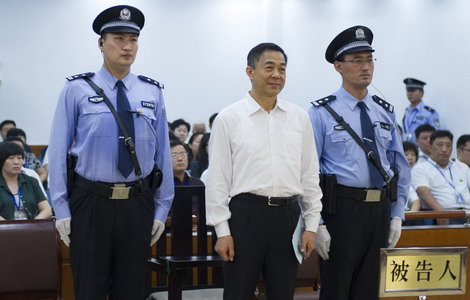Anti-graft watchdog told to convey results
Updated: 2013-09-23 00:09
By ZHAO YINAN in Tianjin (China Daily)
|
||||||||
People who report suspected corruption to China's top anti-graft watchdog will receive feedback after the investigative procedure ends, a new guideline states.
Under the operational guideline released on Sunday, anti-corruption officials must convey the result of investigations of suspected corruption to the people who made the allegations.
The guideline, published on the website of the Central Commission for Discipline Inspection of the Communist Party of China, the country's top disciplinary watchdog, explains in detail what kind of cases are under its supervision and the proper procedures for handling such tips.
By offering a detailed guide, the disciplinary watchdog aims to "standardize the procedure and promote openness", the online statement said.
Under the guideline, the public can report suspected graft to the authority by phone, mail, a personal visit to the office or leaving a message on a designated website.
The data from all letters, online material, telephone and visit records will be imported to an online processing system. Officials will then read the materials and decide how the issue will be handled.
The statement said the central commission will verify the authenticity of the information, warn the government agencies concerned, investigate the case itself or appoint a local sub-branch to do so.
Regardless of what action is taken, the statement requires the results of the investigation be conveyed to the informant once the case is closed.
It is among a series of steps being taken after the Central Commission for Discipline Inspection and the Ministry of Supervision jointly launched their new website this month, which includes an online forum where the public can leave opinions and proposals, as well as ask questions about anti-corruption work.
On Sept 13, the week before Mid-Autumn Festival, the website opened a channel to receive tips about officials presenting gifts or hosting lavish meals with public funds.
Ren Jianming, director of the Clean Governance Research and Education Center at Beihang University in Beijing, said that by offering detailed instructions on how to report suspected corrupt officials, the whistle-blowing process will be more standardized and the public can avoid disseminating unverified information.
"It provides an official channel for whistle-blowers while putting an end to rumors that may defame or blackmail the targeted official," he said.
Previously, China's top court and top prosecutor's office issued a judicial interpretation stating Internet users who share false information that harms the national interest will face up to three years in prison if their posts are viewed 5,000 times or forwarded 500 times.
Although the top court said netizens who help expose corruption online will not face charges, even if their posts are not 100 percent accurate, the bylaw has triggered wide speculation on whether a crackdown on spreading rumors will discourage online tips.
Some legal experts believed the anti-graft authority's public handling of such tips is a way to ease such worries and provide a good channel for whistle-blowers.
On the new website of the disciplinary watchdog, people who provide information will receive a code they can use to follow the progress of the case.
Jiang Ming'an, a Peking University law professor, said it is the key of the online reporting system, since "in the past, there was no way to know whether the tip was accepted".
"The advantage of the official channel for tips is obvious. It is professional and subject to supervision," he said.
Most Viewed
Editor's Picks

|

|

|

|

|

|
Today's Top News
Verdict of Bo Xilai: Life in prison
Amber alert across Asia, but not red
China signs 12 deals with Venezuela
Russian embassy to Syria shelled
Gunmen holding hostages in Nairobi
Bo Xilai gets life in prison
China braces for super typhoon Usagi
New Sino-US ties sought
US Weekly

|

|













